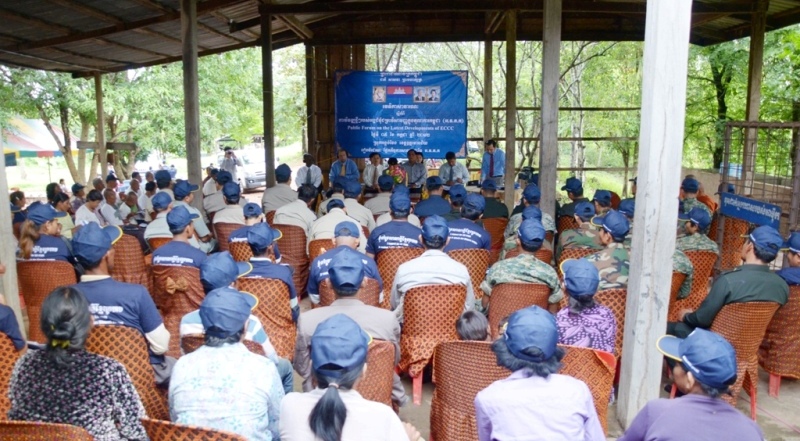“The ECCC was established to prosecute only former senior leaders of the Khmer Rouge and those who were most responsible for the serious crimes committed during the period of Democratic Kampuchea between 17 April 1975 and 6 January 1979. Relatives and friends of Khmer Rouge members are not to be prosecuted, as well as lower level people who served in the Khmer Rouge.” That was the message conveyed by the ECCC officials to the villagers of Anlong Veng during the public forum which was held on the morning of 5 July 2012 at the former home of Ta Mok in Oddar Meanchey province.
This message was echoed repeatedly by each subsequent speaker at the forum, including the Deputy Provincial Governor of Oddar Meancheay and the court officials representing various sections of the ECCC. The public forum was aimed to inform the villagers about the work of the ECCC and explain the importance of ascertaining the truth and seeking justice for the people of Cambodia. Speaking on behalf of their respective offices, representatives from the Office of the Co-Prosecutors, the Victims Support Section, the Defence Support Section and the Public Affairs Section presented to an audience of approximately 200 people. Buddhist monks, former Khmer Rouge soldiers, members of the Royal Cambodian Armed Forces and local villagers from Anlong Veng were present among the event participants.

The district of Anlong Veng remained the last Khmer Rouge stronghold until the group collapsed in early 1999 and reintegrated into the Cambodian government. Although showing support for and interest in the work of the ECCC, some former members of the Khmer Rouge were curious about rumours concerning additional investigations and prosecutions. The news caused some former members of the Khmer Rouge to be worried and concerned. During the question and answer session, one participant asked, “Should there be Cases 003 or 004?” Another villager referring to the advanced age of the Accused asked, “What kind of sentence will they receive, if any, and how will they serve out the term?” The questions, which many people who are interested in the work of the court tend to wonder, continued. One attendee asked, “Why wasn’t the Khmer Rouge tribunal established back in 1979?”
Mr. Sann Roeung, a 60 year-old man who lost his left leg during the Khmer Rouge era, spoke before the panel and expressed his support for the establishment of the tribunal. He went on to say that he hoped the tribunal would speed up its work and prosecute the Accused quickly. Mr. Sann Roeung spent 40 years of his life working for the Khmer Rouge. He joined the movement as a solider in 1972 when he was just 17 years old and strongly believed that the revolution would bring freedom and social equality to the country. Unfortunately, that did not prove to be the case. Mr. Sann Roeung received nothing in return for his service and is now handicapped for the rest of his life. He stated, “I spent 40 years fighting the class struggle cause but all I got was losing my leg. I lived through the Khmer Rouge regime and suffered. I want the trials to be fair so that young generations will learn not to follow in the same footsteps. It is too late for my generation but future generations will be able to make the most of the trial proceedings.”
This is the first time that the ECCC has organized a public forum in Anlong Veng district. It is important that former Khmer Rouge soldiers and sympathizers across Cambodia clearly understand that the ECCC will only prosecute the most senior leaders and those who were most responsible for the crimes that were committed during the period of Democratic Kampuchea. The tribunal will not prosecute any relatives or friends of the former leaders.

Mr. Kham Rithy, a member of the Armed Forces stationed at Anlong Veng Military Sub-Region Unit, told court officials that it was great to hold the forum where several former Khmer Rouge soldiers and cadres lived. The forum helped them better understand the purpose of the court and its mandate. He suggested that such forums should be conducted more frequently in Anlong Veng and he wished to learn more about the tribunal.
The Public Affairs Section has held similar forums in Pailin and Samlout (district of Battambang), other former Khmer Rouge strongholds. Villagers in these areas have also participated in the ECCC outreach program, visiting the court and touring other historical sites. Approximately 150,000 people from all over the country have visited or observed proceedings at the ECCC in person.